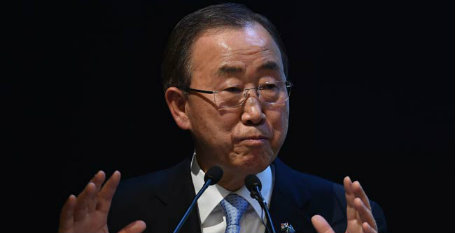United Nations secretary general’s Ban Ki-moon has accused India of intolerance with its continuous ban on consensual adult same-sex relations on gay sex.
United Nations secretary general’s Ban Ki-moon has accused India of intolerance with its continuous ban on consensual adult same-sex relations on gay sex.
"I am proud to stand for the equality of all people - including those who are lesbian, gay, bisexual and transgender. I speak out because laws criminalizing consensual, adult same-sex relationships violate basic rights to privacy and to freedom from discrimination. Even if they are not enforced, these laws breed intolerance," Ban Ki-moon said in a statement while in the Indian capital New Delhi Jan 12.
The secretary general said he "staunchly opposed the criminalization of homosexuality." His comments came on the same day that a minister in the Indian state of Goa that is ruled by the same rightwing political party that runs the federal government announced plans to set up special centers to make LGBT youth "normal.
"Home Ministry statistics showed that until October there were 778 registered cases and 587 arrests under Section 377 of Indian Penal Code in 2014 after Supreme Court in December 2013 struck down a 2009 Delhi High Court verdict which decriminalized same-sex relations, according to the Deccan Herald.
The numbers don’t provide a complete picture as some states have not submitted data while other states have not given data for all the months, the report said. Even with such incomplete data, the National Capital Region of Delhi topped the list with 140 cases and 110 arrests.
The practice of collecting the data related to Section 377 was started only this year, the newspaper said citing the National Crime Records Bureau as saying that it started collecting the data under the monthly crime statistics from January 2014 and does not have statistics for previous years.
The British colonial-era “Section 377” law enacted in 1857 describes same-sex relations as “unnatural” and punishable with up to life imprisonment. The Supreme Court upheld the validity of Section 377 saying that only Parliament had the right to amend the law, when it reversed the 2009 ruling that gave the gay community broad protections and rights.
Gay rights activists say Section 377 say besides being discriminatory leaves the LGBT community open to blackmail, harassment and persecution by authorities as well as criminals. Besides appealing to the government to do away with the law, they have petitioned the Supreme Court to re-examine its decision.
Indian federal Minister of State for Home Haribhai Parathibhai Chaudhary recently told Parliament that his government has no “separate proposal to repeal or amend Section 377.” His rightwing Hindu nationalist Bharatiya Janata Party led government that came to power May 26 champions the draconian British-era colonial anti-gay law and opposes any move to nullify it.












 Printable Version
Printable Version


















Reader's Comments
Please log in to use this feature.